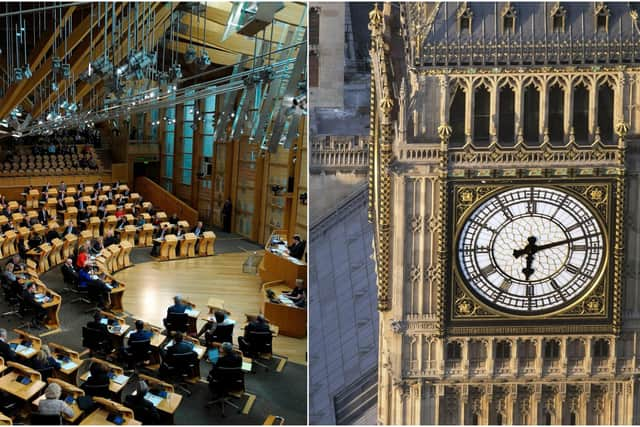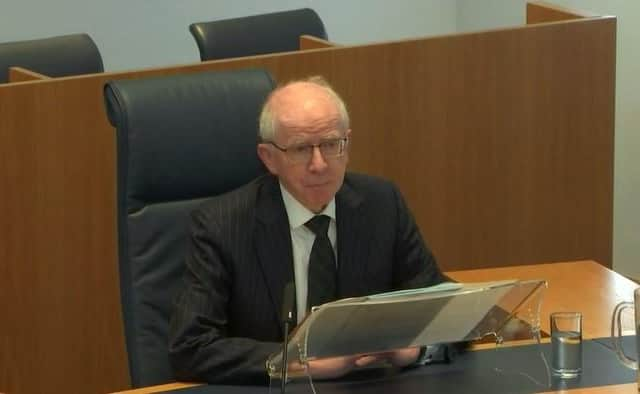SNP accused of 'playing nationalist games' amid Supreme Court defeat over children's rights
and live on Freeview channel 276
Judges at the UK Supreme Court in London ruled against Scottish ministers over the legislative competency of two Bills after a challenge from the UK Government.The United Nations Convention on the Rights of the Child (Incorporation) (Scotland) Bill sought to enshrine the protections on children’s rights into Scots law, while a similar piece of legislation – also passed unanimously by MSPs – was brought in to incorporate the European Charter of Local Self-Government.Supreme Court justices insisted they did not take issue with the Scottish Parliament’s decision to incorporate these sets of standards – but that the manner in which the Bills had sought to do this “breaches the limitations imposed on the legislative competence of the Scottish Parliament by the Scotland Act”
Following the ruling, the SNP was accused by opposition politicians of having deliberately ensured the bill would end up in court in order to manufacture another constitutional grievance before this year’s Holyrood election.But deputy first minister John Swinney said the ruling illustrated that the Scottish Parliament’s powers are “even more limited than we all had understood” and that the decision “lays bare the weakness” of Holyrood.
Advertisement
Hide AdAdvertisement
Hide AdThe court’s decision also sets the scene for the potential clash between the Scottish and the UK Government over a referendum bill, should one be passed by Holyrood in the coming years.


If an independence referendum bill is passed by MSPs, many believe it could be referred to the Supreme Court in the same manner as the UNCRC bill, and set the stage for a major constitutional debate about the powers of the Scottish Parliament.
But the Scottish Tories said the decision was a vindication of their warnings about the bill and proved the SNP had “cynically engineered and manipulated” the bill.
The party added that the SNP’s response to the ruling showed their “obsession with independence”.
Advertisement
Hide AdAdvertisement
Hide AdLord Reed, delivering the judgement of the Supreme Court on Wednesday morning, criticised the UNCRC bill and said it was deliberately designed to go beyond Holyrood’s competency.


The UNCRC bill was passed unanimously by MSPs in March and would have seen the incorporation of the UNCRC into Scots law.
The bill would have made it it unlawful for public authorities and any children’s service provider to act incompatibly with the UNCRC and gave the Children’s Commissioner the right to take legal action in relation to children’s rights.
It was described as a “revolution in children’s rights” by Mr Swinney, when it was passed.
Advertisement
Hide AdAdvertisement
Hide AdHowever, the bill faced a legal challenge from the UK Government who argued parts of the bill did not fall within Holyrood’s powers.
The Supreme Court said the bill would force courts to go beyond interpreting the law, undermine the scrutiny of legislation outlined in the Scotland Act, and make acts of the Scottish Parliament difficult to rely on as “meaning what they say”.
Reacting in Holyrood, Mr Swinney said Scotland fiound itself in a “ludicrous constitutional position”.
Labelling a key legal distinction made by the court – that legislation passed by Westminster and subject to the UNCRC would qualify the power of the UK Parliament to make laws in Scotland – as “arbitrary”, Mr Swinney said the decision “illustrated the incoherence of the powers of the Scottish Parliament within the current devolved settlement”.
Advertisement
Hide AdAdvertisement
Hide AdHe told MSPs: “It makes plain that we are constitutionally prohibited from enacting legislation that this parliament unanimously decided was necessary to enshrine and fully protect the rights of our children.
"Even if the subject matter of that legislation is wholly devolved and could be repealed and replaced by the Scottish parliament, our own children in our own schools, in our own country, but Westminster legislation, so we cannot apply the UNCRC to that legislation.
"That is the ludicrous constitutional position Scotland finds itself in.”
The deputy first minister later added that the decision of the UK Government to challenge the legislation had “constrained” Holyrood’s ability to “maximise the protection” of children through the UNCRC bill.
Advertisement
Hide AdAdvertisement
Hide AdDonald Cameron, the Scottish Tories constitution spokesperson, said his party had warned aspects of the bill would be “legally problematic”.
Responding to the statement from Mr Swinney in Holyrood, he said: “To their shame the SNP did not listen and instead politicised this from the very start.
"That political posturing has been comprehensively demolished of the definitive judgement of the Supreme Court today.
"The judgement by Lord Reed, one of Scotland’s most eminent judges, is unrelenting in its criticism of the Scottish Government approach.”
Advertisement
Hide AdAdvertisement
Hide AdCriticising the Scottish Government’s response to the court defeat as belying their “obsession with independence”, Mr Cameron called for an apology.
He added: “They [the SNP] cynically engineered and manipulated the timing of the Bill to facilitate a pre-election stunt where they provoked a grievance with the UK Government.”
The criticism was echoed by Scottish Labour who called on the government to act now to reintroduce a competent bill.
Questioning the human rights credentials of the government by highlighting the recent revelation the SQA failed on its human rights duties, the party’s education spokesperson, Michael Marra said: “Real and tangible action is needed now and it is possible now.”
Advertisement
Hide AdAdvertisement
Hide AdSarah Boyack, Labour’s constitution spokesperson, added: “This damning verdict makes it clear that the SNP have been playing cynical political games at the expense of children’s human rights.
“This never should have been about petty constitutional bickering – it should have been about putting children’s rights front and centre and empowering our councils to make decisions in their communities.
“It is shameful that both sides have let this fiasco undermine meaningful and progressive legislation. Scotland deserves better.”
The Scottish Government’s coalition partners, the Scottish Greens, claimed the decision was a “dark day for democracy” and was “chilling”.
Advertisement
Hide AdAdvertisement
Hide AdMaggie Chapman, the party’s human rights spokesperson, said: “The fact the UK Government has used the courts to overturn a decision by the Scottish Parliament to protect the rights of children reveals their disregard for human rights and their true intentions when it comes to respecting the will of the devolved nations.
“The idea that this UK government sees international law and human rights as a hinderance to their policy decisions is chilling. On top of this, they want to impose those values on Scotland.
“Boris Johnson’s government is rewriting democracy to ensure the Conservatives have an in-built majority across the UK and can ignore the devolved parliaments. It is becoming clearer than ever that Scotland needs a way out, to chart a different path as a modern progressive nation that respects human rights and looks after our children."
The UNCRC bill and the local government bill will likely return to Holyrood for further consideration.
Advertisement
Hide AdAdvertisement
Hide AdDelivering the verdict, Lord Reed said the court had unanimously decided that four provisions of the UNCRC bill were outside the devolved competence of Holyrood and are incompatible with the Scotland Act which underpins devolution.
He added two provisions of another bill passed in the last session of parliament which incorporated the European Charter of Local Self-Government into Scots law, was also beyond the power of the Scottish Parliament.
The Supreme Court said three provisions of the UNCRC bill “purports to modify” a key section of the Scotland Act, section 28/7, which “preserves the power of the UK parliament to make laws for Scotland”.
One section of the bill which would have seen Westminster bills being read and have the effect which would be compatible with the UNCRC would “impose a qualification upon parliament’s legislative power”.
Advertisement
Hide AdAdvertisement
Hide AdA further section which would have given the courts the ability to strike down and invalidate sections of UK acts of parliament should they be incompatible with the UNCRC would also “affect parliament’s power to make laws for Scotland”.
One key section, which would see the courts given the power to declare an act of the UK parliament as being incompatible with the UNCRC would “impose pressure” on Westminster to repeal or amend the act, and “make it difficult if not impossible” for public bodies and authorities to implement the act.
The justices reserved particular criticism for Section 6 of the UNCRC bill which would have made it unlawful for any public authority to act in a way that is incompatible with the UNCRC.
In the judgement, the Supreme Court said the legislation was drafted to “deliberately exceed the legislative competence of the Scottish Parliament”, but to rely on the court to impost “corrective limitations in individual cases”.
Advertisement
Hide AdAdvertisement
Hide AdTwo provisions of the ECLSG bill were also deemed incompatible for similar reasons to the UNCRC bill, the court said.
Thank you for reading this article. We're more reliant on your support than ever as the shift in consumer habits brought about by coronavirus impacts our advertisers.
If you haven't already, please consider supporting our trusted, fact-checked journalism by taking out a digital subscription.
Comment Guidelines
National World encourages reader discussion on our stories. User feedback, insights and back-and-forth exchanges add a rich layer of context to reporting. Please review our Community Guidelines before commenting.